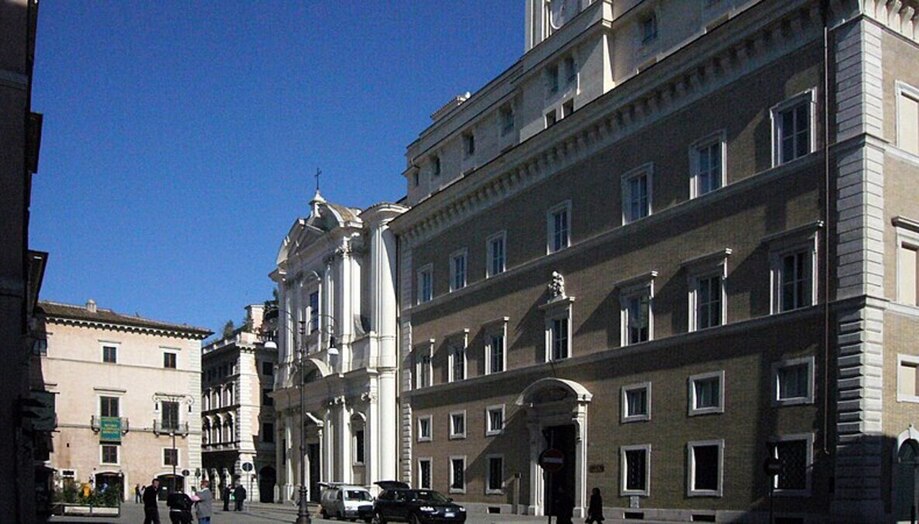About to celebrate its first 40 years of life, the Pontifical University of the Holy Cross in Rome - born at the wish of St. Josemaría Escrivá and founded by Blessed Álvaro del Portillo in October 1984 - is making rapid progress in the implementation of academic research through a unitary project that seeks to address multiple subjects in an interdisciplinary and inter-university way.
A mandate from the Pope
It is also about responding to a specific mandate of Pope Francis, contained in the apostolic constitution "Veritatis gaudium" on universities and ecclesiastical faculties, six years after its signing (January 29, 2018).
Number 4 of this document, in fact, speaks of the "renewal" and "relaunching" of the contribution of ecclesiastical studies and identifies (letter c) inter- and transdisciplinarity as a "fundamental criterion" and "vital principle of the unity of knowledge", although "in the distinction and respect for its multiple, related and convergent expressions".
In this line, the University of the Holy Cross has launched two different calls for applications in recent years, the first one ended in May 2023 and the next one ended just a few days ago.
Proposals related to five strategic areas of study and interest of the University are collected as a result of suggestions gathered by the faculty community itself through interviews and focus groups as early as December 2021.
Once made, these proposals are evaluated and analyzed by a scientific committee in which professors from inside and outside Holy Cross participate according to qualitative and quantitative criteria, in tune with the strategic themes of the University, guaranteeing the continuity and development of the research presented and, of course, the interdisciplinary scope and the ability to involve several researchers and academic institutions.
The proposals submitted
In the first call, 13 proposals were submitted and three projects were approved, involving some thirty professors and researchers from some fifteen universities and academic institutions from different countries.
The call that ended this year, on the other hand, gathered 14 proposals with the participation of more than 50 professors from Holy Cross and a significant number of researchers from other universities.
On this occasion, 4 projects were selected, which together with the 3 previous ones (7 in total) receive funding to cover both administrative management expenses and those related to publications, congresses, participation in conferences and travel abroad.
Projects approved
The topics of reference for these projects include, in order:
Evangelization. The aim is to study the biblical, patristic and historical-theological foundations of a "theology of evangelization", relying on the contribution of the communication sciences and the sociology of religion, in order to define an organic body of reflection leading to the creation of a new institutional discipline to be included in the curriculum of theological studies.
Identity. International forum of experts to explore the essential elements that constitute the identity of Christian-inspired universities and the dimensions in which this is expressed: from teaching to research, including their social and cultural impact. Participants include the University of Notre Dame (USA), the University of Asia and the Pacific (Philippines) and the Universidad Panamericana (Mexico).
Youth. A multi-year project (8 years) of continuous listening to young people, to better understand their values, expectations and hopes. The first phase focused on the religious experience of young people. Partner institutions included the University of Birmingham (UK), Campinas University (Brazil) and Strathmore University (Kenya).
Beginning in the 2024/2025 academic year
Creativity. The project aims to develop an interdisciplinary research on creativity that integrates the contributions of the natural, human, philosophical and theological sciences most relevant to the subject, investigating this characteristic as a "human way of being in the world".
Participants include the University of Copenhagen (Denmark), the London School of Economics (United Kingdom) and the Catholic University of America (United States).
The care. To base on anthropological foundations the so-called "culture of care", a profound vocation of the human person, starting from historical-critical analyses and redefining the concept from those elements that challenge its traditional notion.
Participants will include the University of Valladolid (Spain), the University of the Isthmus (Guatemala) and the University of Messina (Italy).
Church government. Reflection on the foundations of power in the Church, its theological roots, the different forms of power, the proposals of the First and Second Vatican Councils, the dichotomy between the power of order and the power of jurisdiction, the rights of the faithful, etc. Among the universities involved are the University of Navarra and the San Dámaso University of Madrid.
The individual. Exploration of the notion of the individual and the different statuses (metaphysical, theological, empirical, psychological, transcendental, juridical-political and digital) attributed to it, in order to renew reflection in the philosophical and cultural spheres.
Participating universities include Roma Tre (Italy), the Scuola Superiore Sant'Anni di Pisa and the Univrsité de Fribourg-Suisse (Switzerland).







